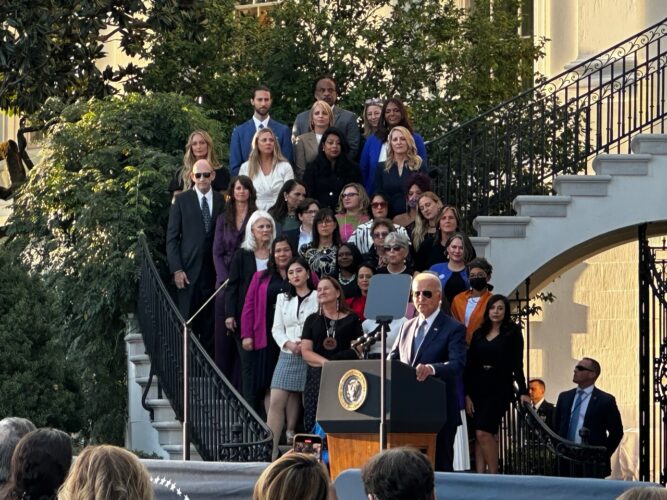White House Event Marks 30 Years of VAWA: Reflections on the Past, Present, and Future in the Fight Against Gender-Based Violence and Internet-Based Abuse
____________________________________________________
By: Elisa D’Amico
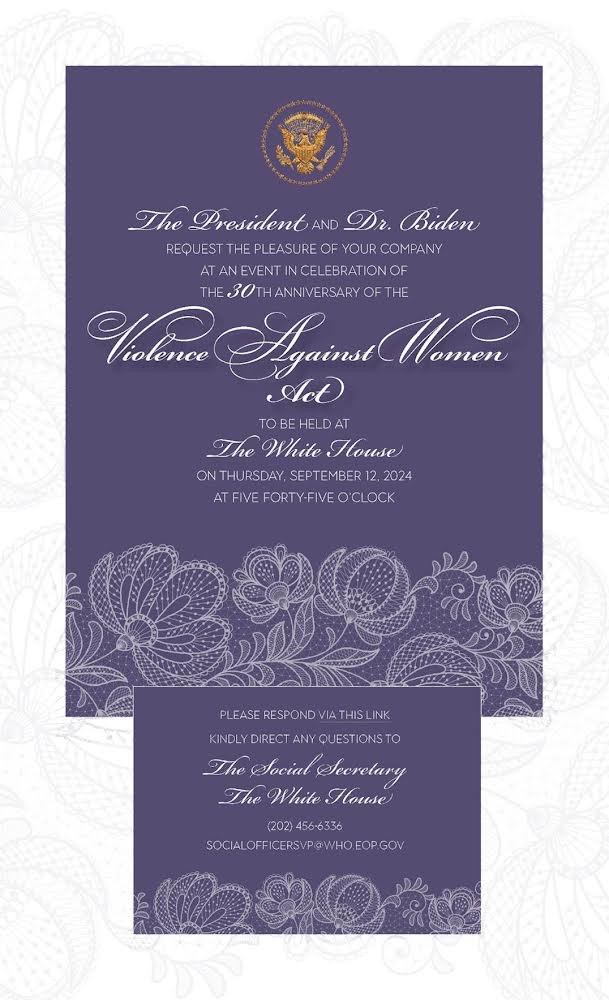
On Thursday, September 12, 2024, I had the privilege of traveling to our nation’s capital to celebrate the 30th anniversary of the Violence Against Women Act (VAWA) with the U.S. Department of Justice (DOJ) Office of Violence Against Women (OVW). First enacted in 1994, VAWA was the first comprehensive federal law focused on preventing and addressing domestic violence, sexual assault, and stalking. Initially, VAWA focused on providing resources and training to improve the responses and policies of law enforcement, prosecutors, and courts, as well as supporting victim services to address crimes historically treated as private matters. As Congress subsequently reauthorized VAWA, it enhanced VAWA policies and expanded grant funding streams in 2000, 2005, 2013, and 2022. OVW has issued more than $11 billion in funding authorized by VAWA in its lifetime, including the recently announced award of over $690 million in grant funding administered by OVW. This funding, which was announced as part of the DOJ’s commemoration of VAWA’s 30th anniversary, will support services for victims and survivors of domestic violence, dating violence, sexual assault, and stalking across all U.S. states and territories, as well as in many Tribal nations.
While in DC, I had the opportunity to meet with other legal advocates, survivors, stakeholders from across OVW’s multiple grant programs, national training & technical assistance providers, community leaders, gender-based violence researchers, philanthropy, and key federal partners. Through a series of engaging panels, interactive breakout sessions, and lectures, we explored critical topics, reflected on the achievements and progress made over the past three decades, and reaffirmed our collective commitment to the ongoing work that remains to be done to enhance the coordinated community response (CCR) and to domestic violence, sexual violence, stalking, dating violence, and other interconnected forms of gender-based violence. Our collaborative discussions allowed us to share thoughts and ideas about emerging issues and opportunities to continue enhancing solutions and strategies for the future through our work under VAWA.
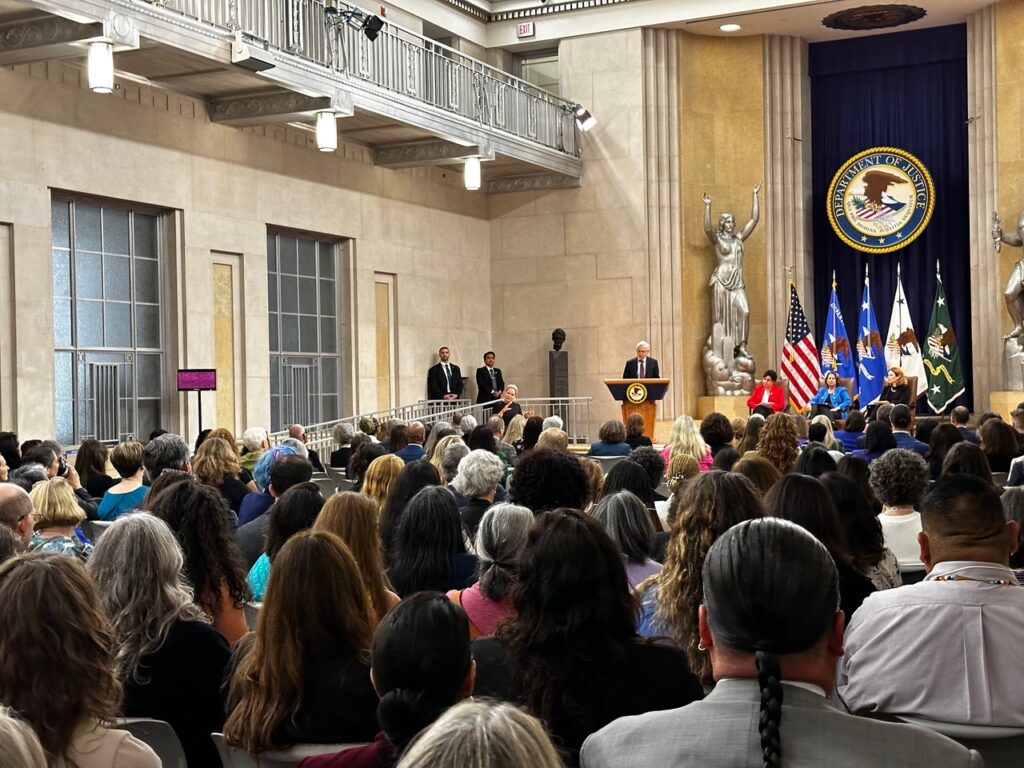
We also heard remarks from Rosemarie Hidalgo, Director of the DOJ’s OVW since July 2023; Attorney General Merrick B. Garland; Deputy Attorney General Lisa Monaco; and Deputy Associate Attorney General Benjamin Mizer. These key federal leaders explored how the federal government can use lessons learned during the last 30 years of VAWA to continue innovating and collaborating to make positive change for survivors. Attorney General Garland announced the designation of an initial set of 78 communities across 47 states, territories, and DC for designation under Section 1103 of the VAWA Reauthorization Act of 2022, and that the DOJ will partner with these jurisdictions to develop plans to reduce intimate partner firearm violence and prioritize prosecutions of domestic violence offenders prohibited from owning firearms. As the DOJ continues coordination with local stakeholders, it will designate additional jurisdictions.
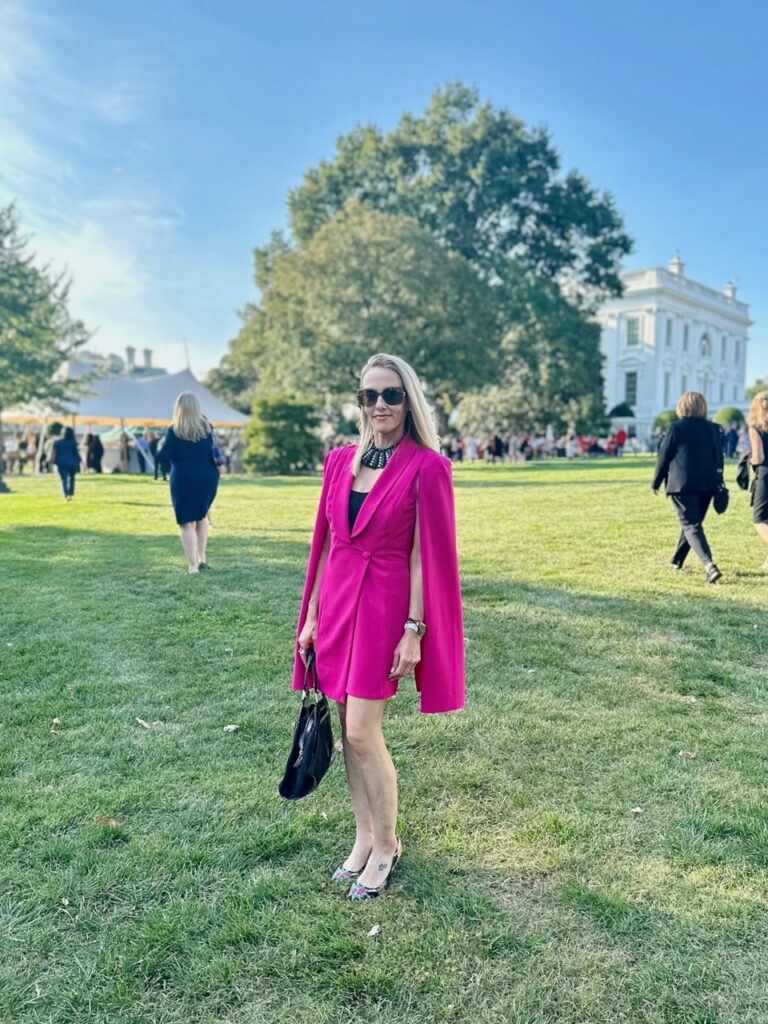
As part VAWA’s anniversary celebration, I was invited, along with my husband, Brian D’Amico, to attend an exclusive event at the White House on Thursday, September 12th. I wore a hot pink caped dress (my signature color), my RBG dissent collar, and matching rhinestone “super-SHERO” heels.
***
Speaking of women’s rights and gender equality, I couldn’t miss the opportunity to mention the late Ruth Bader Ginsburg (a.k.a. Notorious RBG), who passed away on September 18, 2020. This September marks the fourth anniversary of the passing of the RBG—U.S. Supreme Court Justice, legendary advocate for women’s rights and gender equality, and cultural icon. RBG’s legacy is vast and multifaceted, reflecting her lifelong dedication to advancing gender equality, civil rights, and justice. Among other achievements, RBG played a pivotal role in dismantling laws that discriminated based on gender.
As a practicing lawyer, RBG successfully argued several landmark cases before the U.S. Supreme Court. Her work helped establish legal precedents affirming gender equality under the Constitution and fundamentally reshaped how the law viewed gender discrimination, impacting millions of people across the U.S. and inspiring equality movements worldwide. During her time as a Supreme Court Justice, RBG authored numerous influential majority opinions and dissents, some of which led to major legislative changes, such as the Lilly Ledbetter Fair Pay Act, which addressed pay discrimination.
RBG’s brilliant mind, unmatched work ethic, and lifelong commitment to gender equality inspired countless individuals to pursue careers in law, public service, and activism. By challenging gender stereotypes and promoting equality, her work has influenced international human rights discussions, and her legacy continues to inspire activists and legal advocates worldwide.
Her contributions, both in the courtroom and in the broader fight for equality, have had a profound and lasting impact, touching the lives of millions of people around the world. And, her neck collars (or jabots) were more than just accessories that inspired millions (including Yours Truly). They were symbols of her legal stances and expressed her inimitable blend of grace, strength, and intellectual rigor.
***
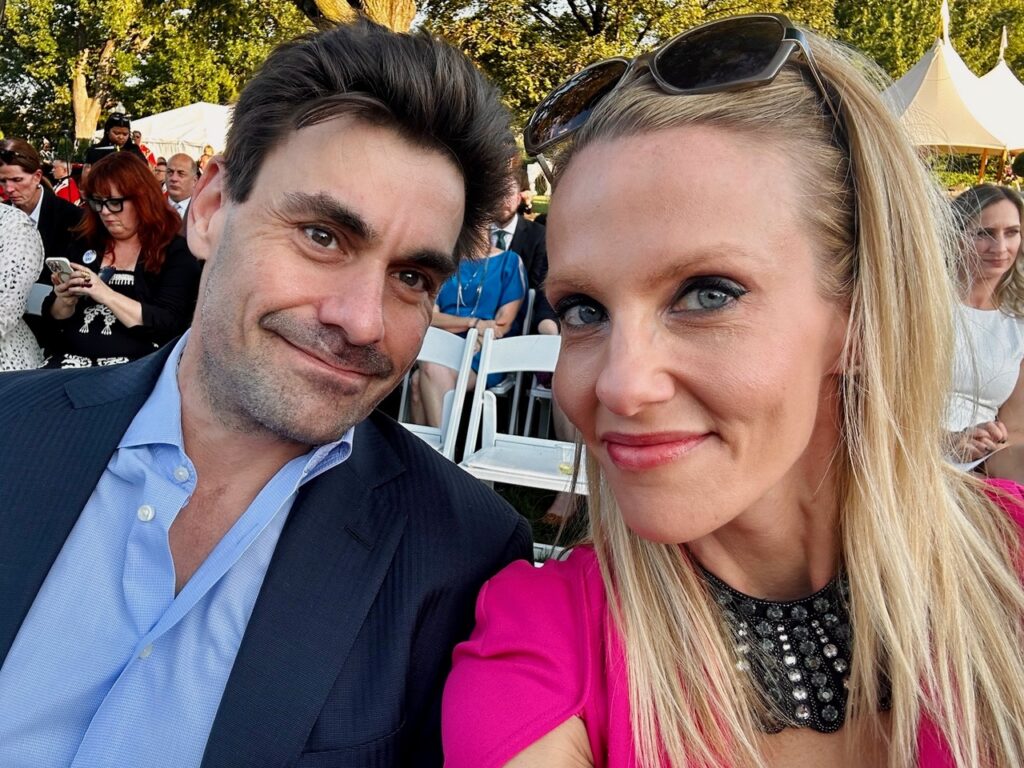
My husband and I checked in with the Secret Service and walked hand-in-hand up to the White House Lawn as the U.S. Marine Band (established by an Act of Congress and signed by President John Adams in 1798) played. After grabbing some celebratory champagne and snacks (served with very fancy napkins adorned with the Presidential seal), we found seats near the band and waited for the program to begin.
After an incredibly beautiful performance by the Duke Ellington Choir, we heard inspiring remarks from Jennifer Klein, Assistant to the President and Director of the first-ever White House Gender Policy Counsel, as well as other key leaders including Ruth Glen, President of Survivor Justice Action. My eyes welled with tears as our nation’s Poet Laureate, Ada Limón, recited an original poem that she wrote for the historic occasion. The event culminated with a moving address by President Biden, where he reflected on the landmark bipartisan legislation he wrote and championed as a U.S. Senator, an achievement that remains his legacy. As we exited the White House property we were handed a commemorative VAWA anniversary coin, which immediately became one of my most cherished possessions.
As a Miami-based victims’ rights attorney, I have passionately poured my heart into this important work for the past 10+ years for clients in Miami and throughout the country. I remain committed to continuing to participate and lead in the fight against bad actors in this ever-evolving digital landscape. The breadth and scope of internet-based abuse and nonconsensual disclosure of intimate images (NDII) are only increasing and expanding as artificial intelligence improves at an almost unfathomable and exponential rate. Not only does this present new challenges in our fight against gender-based violence and internet-based sexual abuse, but it also changes the stakes and dramatically expands the magnitude of harm suffered by innocent victims.
I am proud to continue to advocate for survivors both through my law firm and through my work with the Cyber Civil Rights Initiative (CCRI), a national non-profit organization founded in 2012 Dr. Holly Jacobs, who was the very first client of the Cyber Civil Rights Legal Project (CCRLP), which I co-founded in 2014. As a member of CCRI’s Advisory Committee, I remain committed to furthering the organization’s mission to combat technology-facilitated abuse that threatens the civil rights and civil liberties of victims. The CCRI advocates for technological, social, and legal innovation, and offers services to victims of cybercrimes, including a crisis helpline and myriad resources for victims in the U.S. and internationally.
Looking ahead, I am excited about what is to come in the fight to end gender-based violence and am humbled to play a small part in it. The renewed commitment by the government, legal advocates, and other stakeholders will undoubtedly strengthen the protections for survivors as technology continues to advance at an increasingly rapid rate. As I continue my work to advocate on behalf of those facing NDII, including sextortion and deepfakes, I remain dedicated to finding innovative and effective solutions to combat these expanding forms of harm from gender-based violence and internet-based sexual abuse.
Disclaimer: The information provided in this article is for informational purposes only and does not constitute legal advice. This article is not intended to create and does not create an attorney-client relationship with Elisa D’Amico or her law firm. For specific legal advice regarding your individual situation, please consult directly with a qualified attorney.

